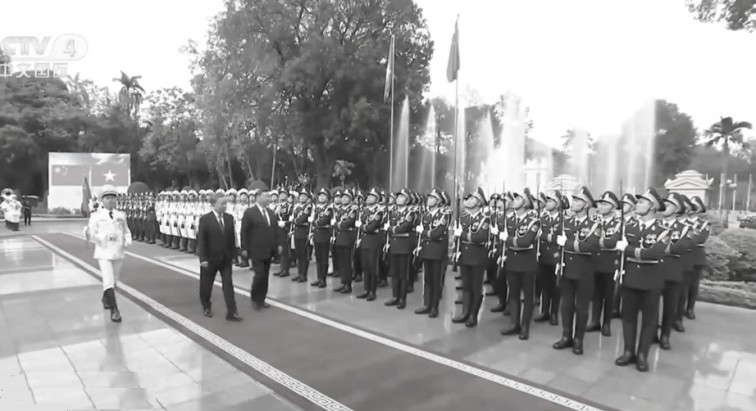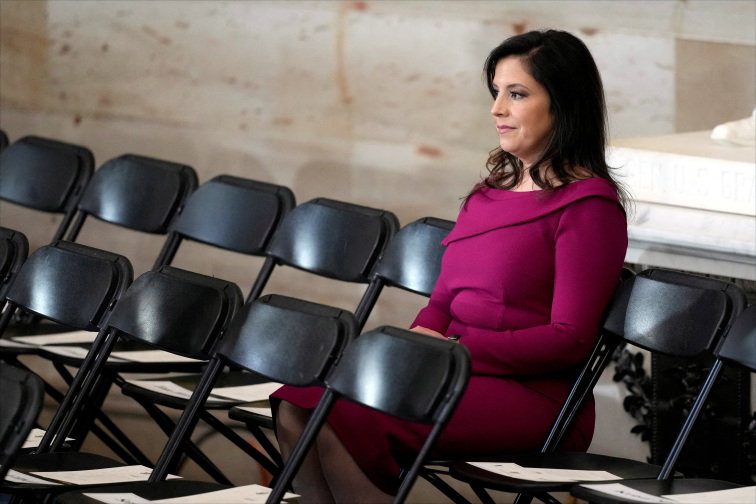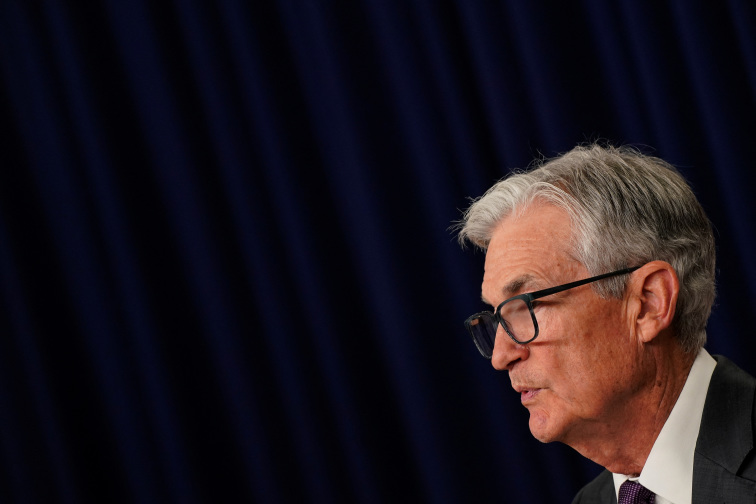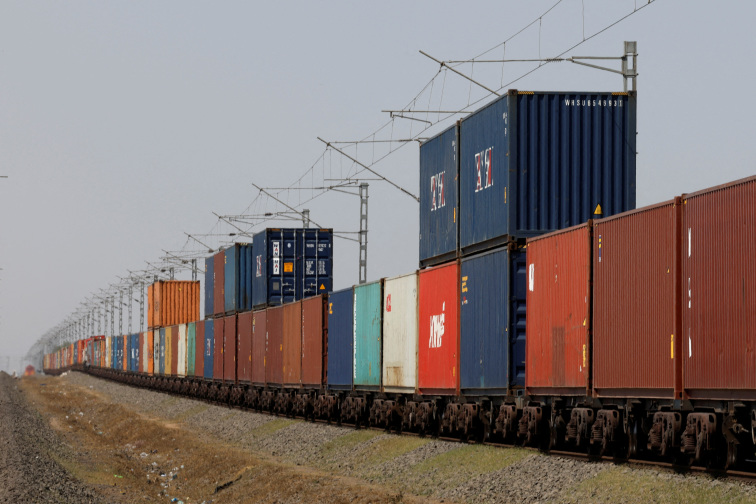Taiwan/Flag of the Republic of China. On January 11, 2023, at a military base in Kaohsiung, Taiwan's armed forces conducted a two-day routine exercise. (Annabelle Chih/Getty Images)
[People News] With U.S. tariffs on Chinese imports reaching 145%—and the White House’s latest statement indicating tariffs could go as high as 245%—Taiwan's Premier has warned that Chinese goods may flood into Southeast Asia and even Taiwan to engage in origin fraud. In response, the Taiwanese government has introduced three lines of defence to prevent illegal transhipment by China.
According to Radio Free Asia, on Wednesday (April 16), Taiwan’s Legislative Yuan Finance Committee invited officials from the Ministry of Finance, the Ministry of Economic Affairs, and other departments to present a special report on strategies to “prevent low-price dumping of Chinese products and origin fraud via Taiwan.”
To block Chinese goods from evading U.S. tariffs by being rerouted through Taiwan with counterfeit “Made in Taiwan” labels, Taiwan’s Ministry of Finance proposed a three-pronged strategy: prevention beforehand, strict inspections during, and heavy penalties after violations.
The report states that in the prevention stage, exporters are required to submit documentation, with high-risk goods and companies subject to strict scrutiny. For the inspection stage, goods bound for the U.S. will be screened for suspicious activity, and customs officers will carefully check the origin labels. High-risk companies will face intensified inspections of goods in bonded warehouses. Lastly, in the penalty stage, if customs finds exporters falsely labelling origin or violating origin labelling rules, they may be fined up to NT$3 million (approx. RMB 450,000) or face a one-year ban on imports/exports.
U.S. and Taiwan Have Different Rules on Product Origin — Lawmaker Warns of Risk
In addition to these three lines of defence, DPP lawmaker Wu Bing-rui expressed concern during questioning that Taiwan and the U.S. define “country of origin” differently. Taiwan uses the “exporting country” standard, while the U.S. bases it on the “country of origin” or “final source.” This discrepancy could lead the U.S. to view Taiwan as a conduit for Chinese origin fraud. Wu elaborated: the U.S. considers any product with 35% of its materials originating from China to be “Made in China,” while Taiwan considers a product “Made in Taiwan” if it adds over 35% in value through processing. This difference creates a grey area.
He gave an example: if a product exported to the U.S. contains 50% raw materials from China and 50% value-added processing in Taiwan, how should it be classified—Made in Taiwan or Made in China?
Wu Bing-rui: “In the above example, Taiwan would see it as Made in Taiwan, but the U.S. would consider it Made in China. That would be seen by the U.S. as origin fraud on behalf of China.”
Deputy Economics Minister Chiang Wen-jo responded: “That determination lies with U.S. customs.” Wu Bing-rui: “If U.S. customs decides it's fraudulent, then it’s a serious problem! If Taiwan is accused of helping China with origin fraud, all of Taiwan’s exported products could face different tariff standards.”
Chiang Wen-jo added that under Taiwan’s current rules, a product is considered “Made in Taiwan” if it either adds 35% value or undergoes a tariff code transformation. He advised that exporters stay in close contact with U.S. clients and request pre-clearance from U.S. customs, submitting details of product components in advance. Wu suggested that Taiwan may need to revise its standards to match those of the U.S. when exporting to America.
Premier: Protect the “MIT” Brand and Crack Down on Counterfeits
As the U.S. continues to escalate tariffs on Chinese products, Taiwan remains highly alert to the risk of illegal transshipments from China.
Taiwanese Premier Cho Jung-tai emphasised during a public event on April 13 that the U.S. government is concerned not only with export controls on high-tech goods and low-price dumping, but also with origin fraud. Some sensitive Taiwanese high-tech products have even been sold back to China by bad actors. Therefore, Taiwan must strictly enforce regulations on illegal transhipment and export controls.
He predicted that Chinese products will soon be priced out of the U.S. market due to high tariffs, and will instead flood other regions like Southeast Asia and even Taiwan. He specifically warned of the “Mini Three Links” (direct sea transport between China’s Fujian coast and Taiwan’s offshore islands like Kinmen and Matsu) as a potential route for such goods. Premier Cho declared that Taiwan’s three lines of defence would be rigorously enforced, and that low-cost dumping would not be allowed to jeopardise Taiwan’s industrial security. “We will absolutely not allow Taiwan to become a tool for Chinese origin fraud,” he said.
He continued: “Made in Taiwan (MIT) is a golden brand and the pride of the Taiwanese people. MIT is MIT—we must protect the brand and fight counterfeits. Where there is MIT, there is no MIC (Made in China),” said Cho. This would not only give Taiwan more leverage in future negotiations with the U.S. but also boost global confidence in Taiwan’s ability to defend both national and economic security.
KMT Proposal for Free Trade Zone on Outlying Islands Sparks Concern
According to reports, opposition KMT legislator Chen Yu-jen recently proposed an amendment to the “Outlying Islands Construction Act.” In Article 18-1, Section 6, the amendment would allow people, corporations, organisations, capital, goods, and services from mainland China to enter and leave a free trade demonstration zone on Taiwan’s offshore islands. The supporting notes mention “appropriately easing relevant regulations.” DPP lawmakers criticised the proposal, warning it could open the door for Chinese origin fraud.
In response, Chen argued that Taiwan already has seven free trade port zones on the main island, and if those are not considered loopholes for origin fraud, it’s unfair to target a proposal for Kinmen that hasn’t even been implemented yet.
Premier Cho addressed this issue in the legislature, stating that the proposal could allow Chinese capital to enter Taiwan’s outlying islands for major construction projects, which must be strictly guarded against.
He emphasised that any risk of origin fraud would be taken seriously in the context of reciprocal tariffs with the U.S., which views illegal transhipment as a serious issue. Taiwan, he said, must do everything it can to prevent it.










News magazine bootstrap themes!
I like this themes, fast loading and look profesional
Thank you Carlos!
You're welcome!
Please support me with give positive rating!
Yes Sure!